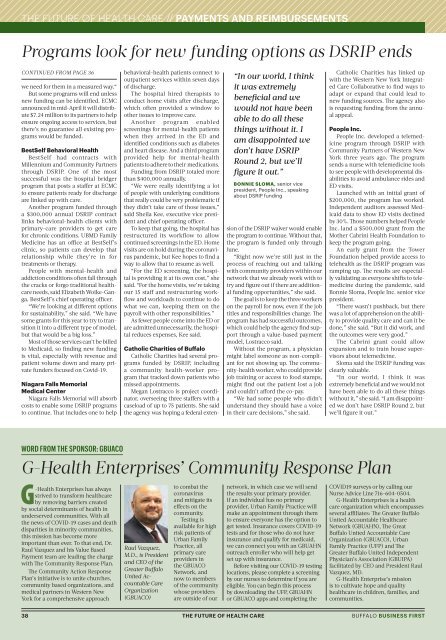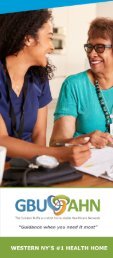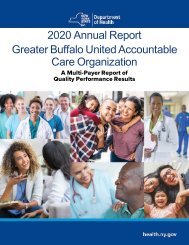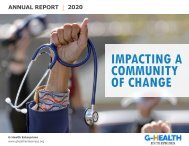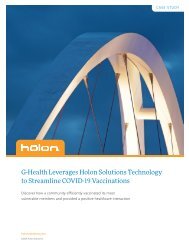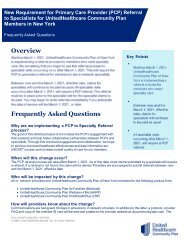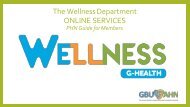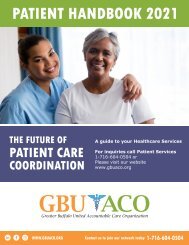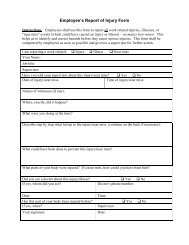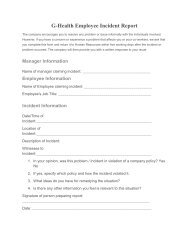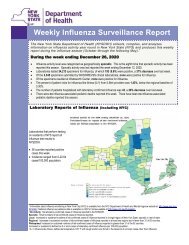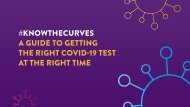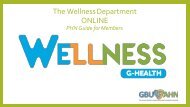Future of Health Care 2020
- No tags were found...
You also want an ePaper? Increase the reach of your titles
YUMPU automatically turns print PDFs into web optimized ePapers that Google loves.
THE FUTURE OF HEALTH CARE // PAYMENTS AND REIMBURSEMENTS<br />
Programs look for new funding options as DSRIP ends<br />
CONTINUED FROM PAGE 36<br />
we need for them in a measured way.“<br />
But some programs will end unless<br />
new funding can be identified. ECMC<br />
announced in mid-April it will distribute<br />
$7.24 million to its partners to help<br />
ensure ongoing access to services, but<br />
there’s no guarantee all existing programs<br />
would be funded.<br />
BestSelf Behavioral <strong>Health</strong><br />
BestSelf had contracts with<br />
Millennium and Community Partners<br />
through DSRIP. One <strong>of</strong> the most<br />
successful was the hospital bridger<br />
program that posts a staffer at ECMC<br />
to ensure patients ready for discharge<br />
are linked up with care.<br />
Another program funded through<br />
a $300,000 annual DSRIP contract<br />
links behavioral-health clients with<br />
primary-care providers to get care<br />
for chronic conditions. UBMD Family<br />
Medicine has an <strong>of</strong>fice at BestSelf’s<br />
clinic, so patients can develop that<br />
relationship while they’re in for<br />
treatments or therapy.<br />
People with mental-health and<br />
addiction conditions <strong>of</strong>ten fall through<br />
the cracks or forgo traditional healthcare<br />
needs, said Elizabeth Woike-Ganga,<br />
BestSelf’s chief operating <strong>of</strong>ficer.<br />
“We’re looking at different options<br />
for sustainability,” she said. “We have<br />
some grants for this year to try to transition<br />
it into a different type <strong>of</strong> model,<br />
but that would be a big loss.”<br />
Most <strong>of</strong> those services can’t be billed<br />
to Medicaid, so finding new funding<br />
is vital, especially with revenue and<br />
patient volume down and many private<br />
funders focused on Covid-19.<br />
Niagara Falls Memorial<br />
Medical Center<br />
Niagara Falls Memorial will absorb<br />
costs to enable some DSRIP programs<br />
to continue. That includes one to help<br />
behavioral-health patients connect to<br />
outpatient services within seven days<br />
<strong>of</strong> discharge.<br />
The hospital hired therapists to<br />
conduct home visits after discharge,<br />
which <strong>of</strong>ten provided a window to<br />
other issues to improve care.<br />
Another program enabled<br />
screenings for mental-health patients<br />
when they arrived in the ED and<br />
identified conditions such as diabetes<br />
and heart disease. And a third program<br />
provided help for mental-health<br />
patients to adhere to their medications.<br />
Funding from DSRIP totaled more<br />
than $400,000 annually.<br />
“We were really identifying a lot<br />
<strong>of</strong> people with underlying conditions<br />
that really could be very problematic if<br />
they didn’t take care <strong>of</strong> those issues,”<br />
said Sheila Kee, executive vice president<br />
and chief operating <strong>of</strong>ficer.<br />
To keep that going, the hospital has<br />
restructured its workflow to allow<br />
continued screenings in the ED. Home<br />
visits are on hold during the coronavirus<br />
pandemic, but Kee hopes to find a<br />
way to allow that to resume as well.<br />
“For the ED screening, the hospital<br />
is providing it at its own cost,” she<br />
said. “For the home visits, we’re taking<br />
our 15 staff and restructuring workflow<br />
and workloads to continue to do<br />
what we can, keeping them on the<br />
payroll with other responsibilities.”<br />
As fewer people come into the ED or<br />
are admitted unnecessarily, the hospital<br />
reduces expenses, Kee said.<br />
“In our world, I think<br />
it was extremely<br />
beneficial and we<br />
would not have been<br />
able to do all these<br />
things without it. I<br />
am disappointed we<br />
don’t have DSRIP<br />
Round 2, but we’ll<br />
figure it out.”<br />
BONNIE SLOMA, senior vice<br />
president, People Inc., speaking<br />
about DSRIP funding<br />
Catholic Charities <strong>of</strong> Buffalo<br />
Catholic Charities had several programs<br />
funded by DSRIP, including<br />
a community health-worker program<br />
that tracked down patients who<br />
missed appointments.<br />
Megan Lostracco is project coordinator,<br />
overseeing three staffers with a<br />
caseload <strong>of</strong> up to 75 patients. She said<br />
the agency was hoping a federal extension<br />
<strong>of</strong> the DSRIP waiver would enable<br />
the program to continue. Without that,<br />
the program is funded only through<br />
June.<br />
“Right now we’re still just in the<br />
process <strong>of</strong> reaching out and talking<br />
with community providers within our<br />
network that we already work with to<br />
try and figure out if there are additional<br />
funding opportunities,” she said.<br />
The goal is to keep the three workers<br />
on the payroll for now, even if the job<br />
titles and responsibilities change. The<br />
program has had successful outcomes,<br />
which could help the agency find support<br />
through a value-based payment<br />
model, Lostracco said.<br />
Without the program, a physician<br />
might label someone as non-compliant<br />
for not showing up. The community-health<br />
worker, who could provide<br />
job training or access to food stamps,<br />
might find out the patient lost a job<br />
and couldn’t afford the co-pay.<br />
“We had some people who didn’t<br />
understand they should have a voice<br />
in their care decisions,” she said.<br />
Catholic Charities has linked up<br />
with the Western New York Integrated<br />
<strong>Care</strong> Collaborative to find ways to<br />
adapt or expand that could lead to<br />
new funding sources. The agency also<br />
is requesting funding from the annual<br />
appeal.<br />
People Inc.<br />
People Inc. developed a telemedicine<br />
program through DSRIP with<br />
Community Partners <strong>of</strong> Western New<br />
York three years ago. The program<br />
sends a nurse with telemedicine tools<br />
to see people with developmental disabilities<br />
to avoid ambulance rides and<br />
ED visits.<br />
Launched with an initial grant <strong>of</strong><br />
$200,000, the program has worked.<br />
Independent auditors assessed Medicaid<br />
data to show ED visits declined<br />
by 30%. Those numbers helped People<br />
Inc. land a $500,000 grant from the<br />
Mother Cabrini <strong>Health</strong> Foundation to<br />
keep the program going.<br />
An early grant from the Tower<br />
Foundation helped provide access to<br />
telehealth as the DSRIP program was<br />
ramping up. The results are especially<br />
validating as everyone shifts to telemedicine<br />
during the pandemic, said<br />
Bonnie Sloma, People Inc. senior vice<br />
president.<br />
“There wasn’t pushback, but there<br />
was a lot <strong>of</strong> apprehension on the ability<br />
to provide quality care and can it be<br />
done,” she said. “But it did work, and<br />
the outcomes were very good.”<br />
The Cabrini grant could allow<br />
expansion and to train house supervisors<br />
about telemedicine.<br />
Sloma said the DSRIP funding was<br />
clearly valuable.<br />
“In our world, I think it was<br />
extremely beneficial and we would not<br />
have been able to do all these things<br />
without it,” she said. “I am disappointed<br />
we don’t have DSRIP Round 2, but<br />
we’ll figure it out.”<br />
WORD FROM THE SPONSOR: GBUACO<br />
G-<strong>Health</strong> Enterprises’ Community Response Plan<br />
G-<strong>Health</strong> Enterprises has always<br />
strived to transform healthcare<br />
by removing barriers created<br />
by social determinants <strong>of</strong> health in<br />
underserved communities. With all<br />
the news <strong>of</strong> COVID-19 cases and death<br />
disparities in minority communities,<br />
this mission has become more<br />
important than ever. To that end, Dr.<br />
Raul Vazquez and his Value Based<br />
Payment team are leading the charge<br />
with The Community Response Plan.<br />
The Community Action Response<br />
Plan’s initiative is to unite churches,<br />
community based organizations, and<br />
medical partners in Western New<br />
York for a comprehensive approach<br />
Raul Vazquez,<br />
M.D., is President<br />
and CEO <strong>of</strong> the<br />
Greater Buffalo<br />
United Accountable<br />
<strong>Care</strong><br />
Organization<br />
(GBUACO)<br />
to combat the<br />
coronavirus<br />
and mitigate its<br />
effects on the<br />
community.<br />
Testing is<br />
available for high<br />
risk patients <strong>of</strong><br />
Urban Family<br />
Practice, all<br />
primary care<br />
providers in<br />
the GBUACO<br />
Network, and<br />
now to members<br />
<strong>of</strong> the community<br />
whose providers<br />
are outside <strong>of</strong> our<br />
network, in which case we will send<br />
the results your primary provider.<br />
If an individual has no primary<br />
provider, Urban Family Practice will<br />
make an appointment through them<br />
to ensure everyone has the option to<br />
get tested. Insurance covers COVID-19<br />
tests and for those who do not have<br />
insurance and qualify for medicaid,<br />
we can connect you with an GBUAHN<br />
outreach enroller who will help get<br />
set up with insurance.<br />
Before visiting our COVID-19 testing<br />
locations, please complete a screening<br />
by our nurses to determine if you are<br />
eligible. You can begin this process<br />
by downloading the UFP, GBUAHN<br />
or GBUACO apps and completing the<br />
COVID19 surveys or by calling our<br />
Nurse Advice Line 716-604-0504.<br />
G-<strong>Health</strong> Enterprises is a health<br />
care organization which encompasses<br />
several affiliates: The Greater Buffalo<br />
United Accountable <strong>Health</strong>care<br />
Network (GBUAHN), The Great<br />
Buffalo United Accountable <strong>Care</strong><br />
Organization (GBUACO), Urban<br />
Family Practice (UFP) and The<br />
Greater Buffalo United Independent<br />
Physician’s Association (GBUIPA)<br />
facilitated by CEO and President Raul<br />
Vazquez, MD.<br />
G-<strong>Health</strong> Enterprise’s mission<br />
is to cultivate hope and quality<br />
healthcare in children, families, and<br />
communities.<br />
38 THE FUTURE OF HEALTH CARE BUFFALO BUSINESS FIRST


